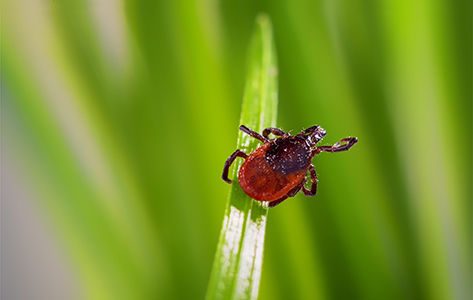If you live, work, or play in New Jersey’s woods or grasslands, it’s difficult to avoid exposure to ticks and tick-borne illnesses. Most people know that blacklegged (deer) ticks can transmit Lyme disease, but there are other local tick varieties that also carry harmful pathogens that can cause human disease. Here’s how to make sure you — and your furry friends — are protected.
Janine Ruppert, a nurse practitioner at Atlantic Health System, is all too familiar with treating patients who’ve been bitten by a tick. She says, “You usually won’t feel when a tick bites. You might not even notice it on your body until it grows larger. And the bullseye rash only develops around the site of the puncture in 80% of cases, about three to 30 days after the bite.”
Finding a tick on your body
So, if you find a tick crawling on your body, remove it, but don’t worry about contracting disease. However, if a tick is attached to your skin, remove it properly — and pay attention. In most cases, Lyme disease bacteria isn’t transmitted until a tick has been attached for about 36 hours. If a bullseye rash or other symptoms such as fever, headache, muscle pain, fatigue or joint swelling develop, call your doctor.
Here’s how the Centers for Disease Control and Prevention recommends removing a tick:
- Use clean, fine-tipped tweezers to grasp the tick as close to the skin’s surface as possible.
- Pull upward with steady, even pressure. Don’t twist or jerk the tick; this can cause mouth-parts to break off and remain in the skin. If this happens, remove the mouth-parts with tweezers. If you cannot remove the mouth easily with tweezers, leave it alone and let the skin heal.
- After removing the tick, thoroughly clean the bite area and your hands with rubbing alcohol or soap and water.
- Never crush a tick with your fingers. Here are a few ways to dispose of a live tick:
- Put it in alcohol
- Place it in a sealed bag/container
- Wrap it tightly in tape
- Flush it down the toilet
Preventing a tick bite
Ticks are looking for a warm host to attach to and feed from, and animals or humans are just what they’re after. To avoid being a tick’s next meal, here are a few tips:
- Cover your skin with long-sleeved shirts, pants, high socks, a hat, and closed-toe shoes.
- Wear bright colors rather than dark colors so you can see ticks on your clothing.
- Spray DEET repellant on clothes and skin to prevent insect bites.
- Stay on trails as much as possible.
“When you get home, do a full body check using a mirror for those hard-to-see places: underarms, hair, ears, behind knees, around the waist and inside the belly button. Then take a shower,” says Janine. “Putting your clothes in the dryer for 10 minutes will kill any ticks that have made it to your house, because where there’s one, there’s more.”












